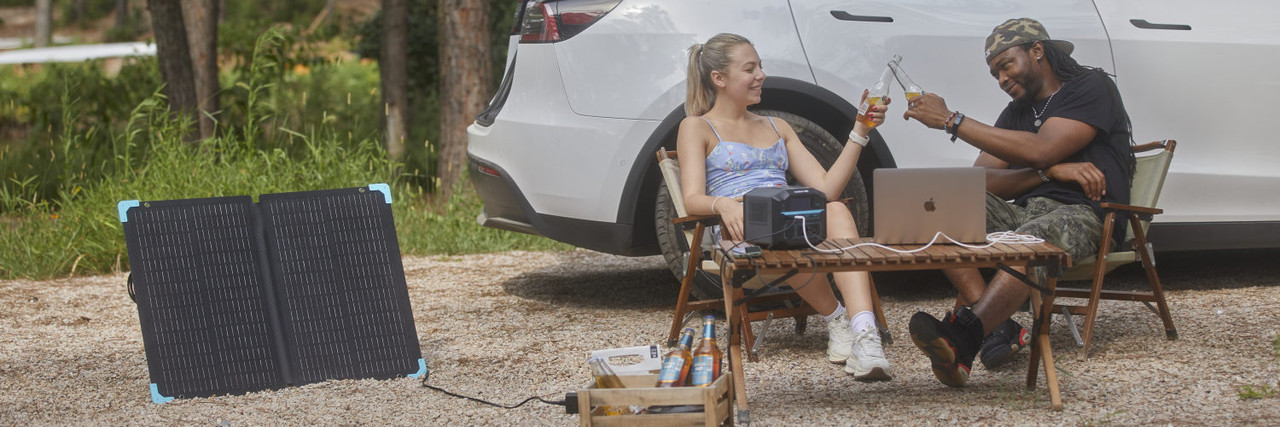Solar Panels for Campers: A Beginner’s Guide to RV Solar System
Solar panels for campers have revolutionized the way outdoor enthusiasts power their adventures. These portable energy solutions offer a sustainable and convenient way to keep your devices charged and appliances running while exploring the great outdoors. Whether you're embarking on a weekend getaway or a long-term camping expedition, solar panels provide a reliable source of clean energy that can significantly enhance your camping experience. By harnessing the sun's power, campers can reduce their reliance on traditional power sources, minimize their environmental impact, and enjoy the freedom to venture further off the grid. In this article, we'll explore the benefits of solar panels for campers, discuss different types available, and offer tips on choosing the right system for your needs.
Types of Solar Panels for Campers
When it comes to solar panels for campers, there are several options available to suit different needs and camping styles. Understanding these types can help you choose the best portable solar panels for camping.
- Rigid Solar Panels: Rigid solar panels are the traditional workhorses of solar power for campers. These solar panels for camping are typically made of silicon cells encased in a sturdy frame, often aluminum. They offer high efficiency, converting a significant portion of sunlight into usable electricity. Rigid panels are ideal for permanent installations on RV roofs or for campers who prioritize power output over portability.
- Flexible Solar Panels: Flexible solar panels represent a more modern approach to camping solar panels. These thin, bendable panels can conform to curved surfaces, making them versatile for various camping setups. They're made using thin-film solar cell technology, which allows for their unique flexibility.
- Foldable Solar Panels: Foldable solar panels offer an excellent middle ground between rigid and flexible options. These portable solar panels for camping typically consist of several rigid or semi-rigid panels connected with a flexible backing, allowing them to be folded for storage and unfolded when in use.
- Solar Blankets: Extremely lightweight and flexible, solar blankets can be draped over tents or vehicles. They're ideal for ultralight camping but generally produce less power than other types.
- Integrated Solar Systems: Some camping gear, like backpacks or tents, come with built-in solar panels, offering a seamless way to harness solar power on the go.
Best Solar Panels for Camping
When it comes to powering your outdoor adventures, Renogy offers top-notch solar solutions for campers and RV enthusiasts. Let's look at three excellent options to keep your devices charged and appliances running while enjoying the great outdoors:
1. 200 Watt 12 Volt Monocrystalline Solar Panel
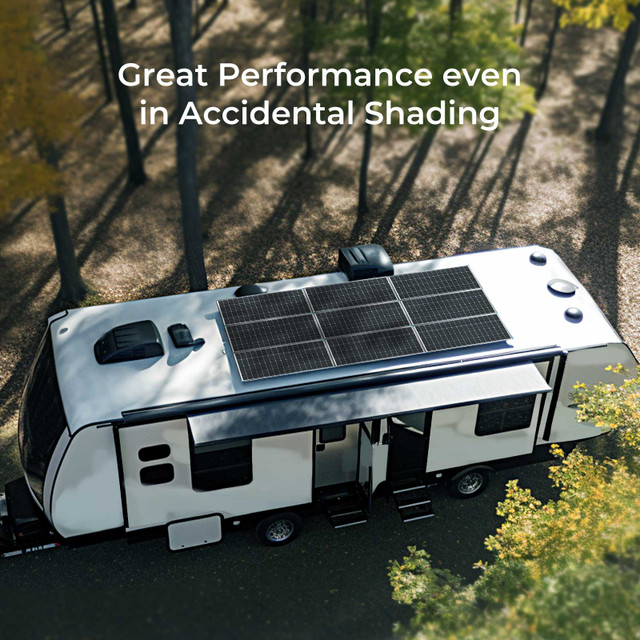
For campers seeking a powerful yet portable solar solution, the Renogy 200W 12V Monocrystalline Solar Panel is an excellent choice. This panel is perfect for those who need reliable power output for longer camping trips or larger power demands. Its grade A+ solar cells ensure stable solar conversion, while the IP65 waterproof rating makes it suitable for various weather conditions.
Priced at $224.99 (reduced from $289.99), this panel offers:
- 1000 Watt-hours of electricity per day (5-6 hours of direct sunlight)
- Durable construction with a 25-year warranty
- High efficiency with 9 bus-bars and PERC cell technology
- Enhanced shade tolerance thanks to half-cut cells and bypass diodes
2. Renogy 400W Lightweight Portable Solar Suitcase
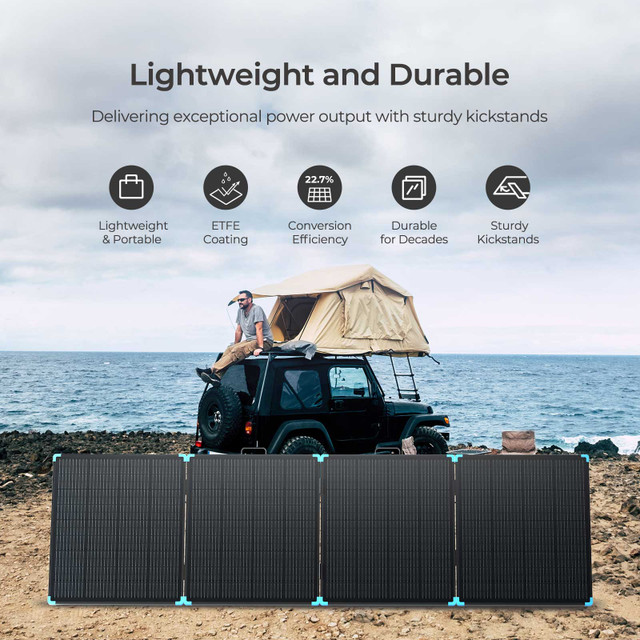
For campers who prioritize portability without sacrificing power, the Renogy 400W Lightweight Portable Solar Suitcase is an ideal solution. Perfect for remote camping, tailgating, or emergency power, this solar suitcase combines high output, durability, and ease of use. It confidently powers camping gear, charges multiple devices, and runs small appliances, keeping you connected off-grid.
Currently priced at $649.99 (marked down from $999.99), this innovative solar panel offers:
- 400W of lightweight and foldable high-wattage solar power
- Compact folded dimensions: 111.8"x33.7"x0.8in (283885520mm)
- Ultra-portable design weighing only 13.7 lbs
- Durable construction with IP67 water resistance
- MC4 port compatibility for versatile connections
- 3000+ fold and unfold durability
- 5-Year warranty for peace of mind
3. 4X4 Explorer Kit: The Ultimate Portable Power Station
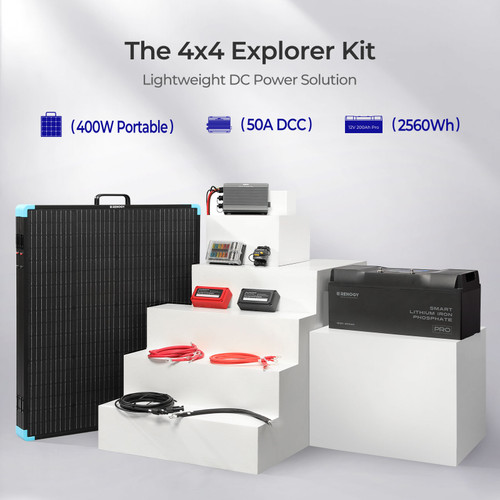
For a comprehensive solar power solution, consider the Renogy 4X4 Explorer Kit. This all-in-one package is designed for campers who need versatile power options. And This kit can power your appliances for 1-2 days, making it ideal for weekend getaways or extended camping trips. It's capable of running essential items like water pumps, awning lights, roof lights, and even a small freezer.
Priced at $2099.99 (down from $2799.99), the 4X4 Solution offers:
- 56kWh storage capacity
- 720W solar input
- 2kWh max output power
- Three versatile kit options for various DC/AC power needs
- Space-saving design perfect for car camping
- Easy installation with flexible mounting options
- Upgraded BMS for enhanced system monitoring
Both options showcase Renogy's commitment to providing reliable, efficient, and user-friendly solar power solutions for campers. Whether you're looking for a standalone panel or a complete power station, these products will help you harness the sun's energy to enhance your camping experience.
Remember to consider your specific power needs, camping style, and budget when choosing between these solar options. With Renogy's solar panels, you can enjoy the comforts of home while embracing the beauty of the great outdoors.
How Do Solar Panels Work On Camper
When you're out exploring the great outdoors, camping solar panels become your silent companion, harnessing the sun's energy to power your adventures. These innovative panels, whether mounted on your camper's roof or set up as portable units, work tirelessly to convert sunlight into electricity. Here’s a breakdown of their operation:
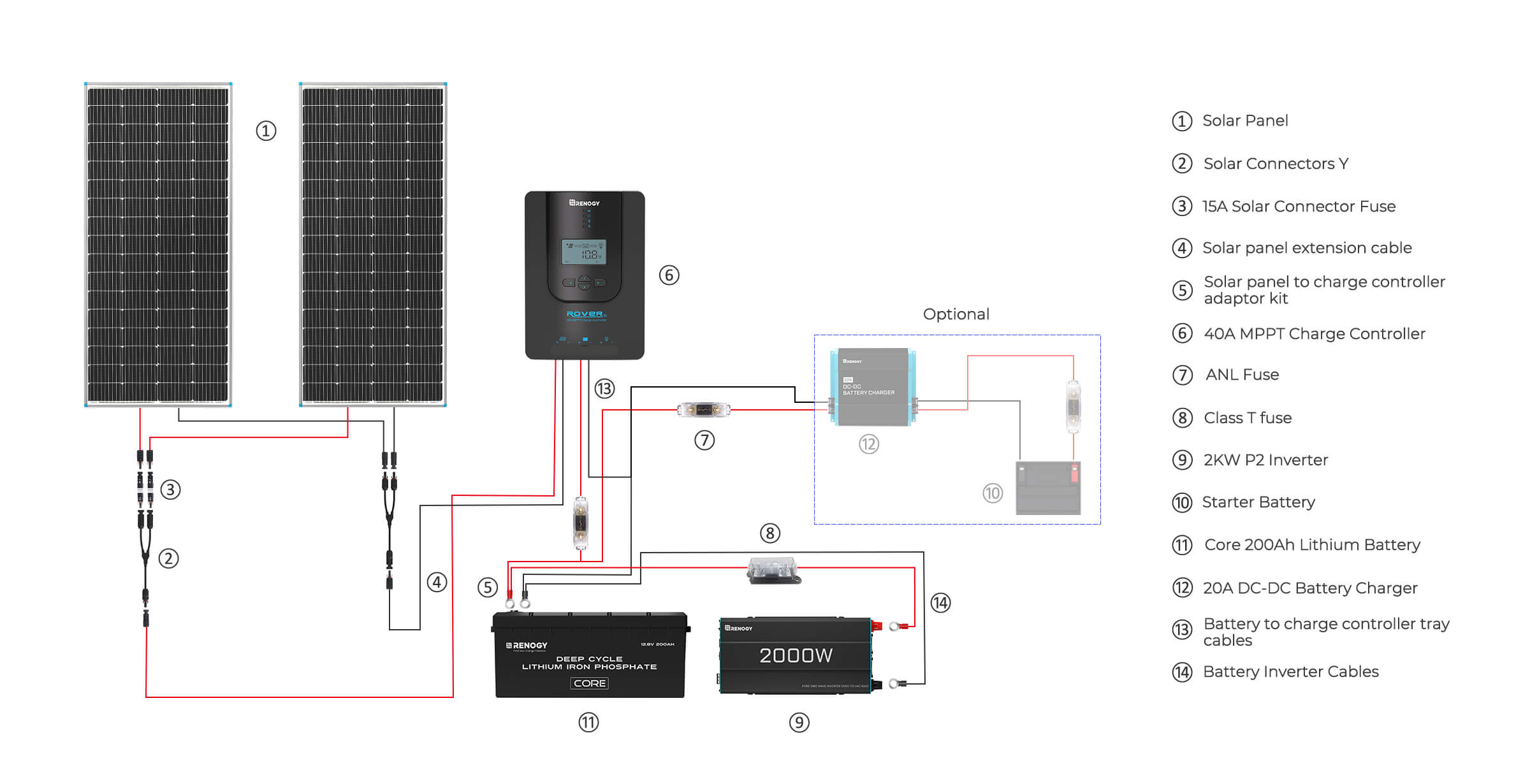
Solar panels are equipped with photovoltaic cells that absorb sunlight, initiating a remarkable process where photons are converted into electrical current. This direct current (DC) flows through a charge controller, ensuring the camper's battery remains optimally charged without risk of overloading.
The stored energy in your camper’s battery becomes a versatile power source, catering to your needs—whether it’s lighting up the night, running essential appliances, or keeping your devices charged. Camping solar panels empower you to embrace off-grid living sustainably, enhancing your camping experience with reliable, eco-friendly energy.
Factors that Affect Solar Panels Efficiency
Efficiency plays a crucial role in selecting solar panels for campers, impacting their ability to provide reliable power during outdoor adventures. Several key factors influence their performance:
- Sunlight Exposure: The amount and quality of sunlight directly affect how much electricity solar panels can generate. Panels positioned in unobstructed sunlight maximize energy production.
- Panel Quality: The technology and materials used in solar panels determine their efficiency in converting sunlight into electricity. High-quality panels typically offer better performance and durability.
- Temperature: Solar panels operate most efficiently in moderate temperatures. Excessive heat can decrease efficiency, while cooler climates may slightly enhance performance.
- Orientation and Positioning: Properly orienting solar panels towards the sun and ensuring they are positioned optimally throughout the day maximize energy capture.
Benefits of RV Solar Panels

Solar panels for campers offer numerous advantages, making them an increasingly popular choice among outdoor enthusiasts. Camping solar panels provide a sustainable and quiet power source, eliminating the need for noisy generators. This eco-friendly solution allows you to enjoy nature without disturbing the peace or wildlife.
Portable solar panels for camping offer flexibility, allowing you to adjust your setup based on sun exposure and energy needs. They're also low-maintenance, requiring minimal upkeep once installed. Solar panels for camping reduce your reliance on campground hookups, giving you the freedom to explore off-grid locations.
Additionally, RV solar panels can help extend your battery life and reduce fuel costs. While the initial investment might be higher, the long-term savings on energy expenses make solar a cost-effective choice for frequent campers and full-time RVers.
How Many Solar Panels Do I Need on My Camper
Determining the right number of solar panels for your camper is crucial for a successful off-grid adventure. The answer depends on your energy needs and available space. To calculate how many solar panels do you need, first list all your power-consuming devices and their wattage. Then, estimate how long you'll use each item daily. For an average camper, 2-3 solar panels are often sufficient.
For most campers, a 100-200 watt setup suffices for basic needs like charging phones, running LED lights, and powering a small fridge. However, if you're running energy-intensive appliances or planning extended trips, you might need 400 watts or more.
Consider portable solar panels for camping as a flexible option. These allow you to adjust your setup based on your current needs and sun exposure. Camping solar panels come in various sizes, from compact 50-watt units to larger 200-watt panels.
Remember, it's better to slightly overestimate your needs. This ensures you have enough power for cloudy days and future upgrades to your camping solar panel system.
Can You Run Your Camper AC on Solar Panels
Running your camper's air conditioning on solar panels is challenging but possible with the right setup. Camping solar panels, especially portable solar panels for camping, are popular for powering various devices. However, air conditioners require significant energy, often exceeding what typical solar panels for campers can provide.
To run an AC, you'd need a large solar array (usually 1000+ watts), a robust battery bank, and a powerful inverter. This setup is considerably larger than what most campers use for basic needs. While it's technically feasible, it's often impractical due to space constraints and cost.
Instead, consider energy-efficient alternatives like improved insulation, ventilation fans, or a smaller, portable AC unit that's more compatible with solar power systems for camping.
Conclusion
Solar panels for campers have revolutionized power management in outdoor adventures, providing sustainable energy for various needs. While the number of panels required depends on individual energy demands, even a basic setup can significantly boost off-grid capabilities. Although powering high-energy devices like air conditioners solely on solar remains challenging, the technology continues to improve. When integrating solar panels for campers, carefully assess your power needs and choose a system balancing performance and practicality. Renogy offers high-quality panels and solar kits designed specifically for RVs and campers, suitable for both novices and experienced users. With the right configuration of solar panels for campers, you can enjoy the freedom and sustainability of solar power on your camping adventures, making the most of nature's abundant energy source.

